Top 10 Largest Stadium In Africa
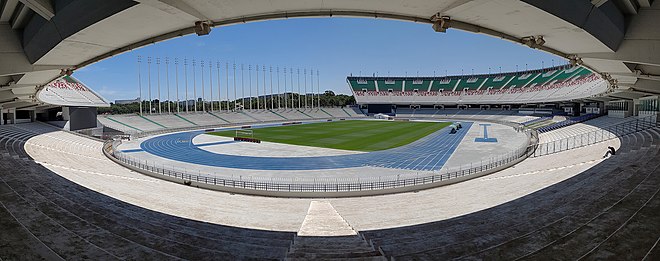
Sport plays a crucial role in shaping societies, economies, and cultures across the world. In recent years, Africa has emerged as a significant player in the global sports industry, producing world-class athletes and hosting major sporting events. The continent has seen a steady growth in its sporting infrastructure, with the construction of modern stadiums capable of hosting tens of thousands of fans.
In this article, we will explore the top ten largest stadiums in Africa. These stadiums are architectural marvels and are equipped with state-of-the-art facilities, making them ideal venues for various events, including sports competitions, concerts, and cultural festivals. We will look at their seating capacities, locations, and some of the notable events they have hosted.
The article will begin with a brief overview of the importance of sports in Africa and how the sports industry has grown on the continent. We will then delve into the top ten largest stadiums in Africa, highlighting their unique features and contributions to sports and entertainment. Lastly, we will touch on the future of sports infrastructure in Africa and how it is poised to shape the continent's sporting landscape in the years to come.
Stadiums are an essential infrastructure for any country or city that aspires to host large-scale sporting events, concerts, or other mass gatherings. Africa, as the world's second-largest continent, has a significant number of large stadiums that can accommodate tens of thousands of people. In this article, we will list the top ten largest stadiums in Africa.
Largest Stadium in Africa 2024
- FNB Stadium, South Africa
- Borg El Arab Stadium, Egypt
- Cairo International Stadium, Egypt
- Stade 5 Juillet 1962, Algeria
- Stade Mohamed V, Morocco
- Stade 26 Mars, Mali
- Ellis Park Stadium, South Africa
- Estádio 11 de Novembro, Angola
- National Stadium, Nigeria
- Lucas Moripe Stadium, South Africa
1. FNB Stadium, South Africa

FNB Stadium, also known as Soccer City, is located in Johannesburg, South Africa. It is the largest stadium on the continent with a seating capacity of 94,736. The stadium was constructed in 1987 and underwent significant renovations for the 2010 FIFA World Cup. FNB Stadium hosted the opening and final matches of the tournament and is the home stadium of the South African national football team.
READ ALSO » Top 10 Largest Stadium In Europe 2023
It is the first-largest stadium in Africa. It was built for the 2010 FIFA World Cup and hosted the opening and closing ceremonies of the tournament, as well as the final match. The stadium is the home of the South African national football team and Kaizer Chiefs FC.
The stadium has a unique design, with a calabash-inspired shape and a unique lighting system that can change colors to reflect the colors of the team playing.
2. Borg El Arab Stadium, Egypt
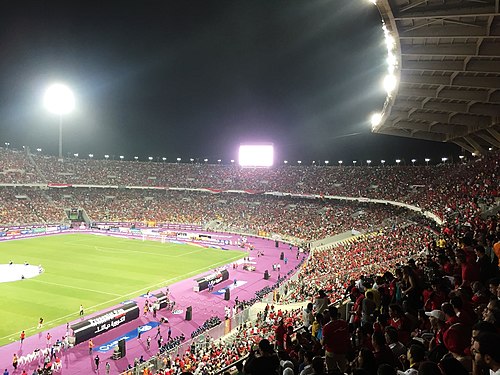
Borg El Arab Stadium is located in Alexandria, Egypt. It has a seating capacity of 86,000 and is the second-largest stadium in Africa. The stadium was opened in 2007 and is the home stadium of the Egyptian national football team.
Stade des Martyrs, Democratic Republic of Congo
Stade des Martyrs is located in Kinshasa, Democratic Republic of Congo. It has a seating capacity of 80,000 and is the third-largest stadium in Africa. The stadium was originally built in 1994 and underwent renovations in 2013. It is the home stadium of the Congolese national football team and several local clubs.
The stadium has a unique design, with a circular seating bowl and a retractable roof that can be closed in case of bad weather. The stadium is also equipped with modern facilities, including VIP boxes, a press center, and several food and beverage outlets.
3. Cairo International Stadium, Egypt
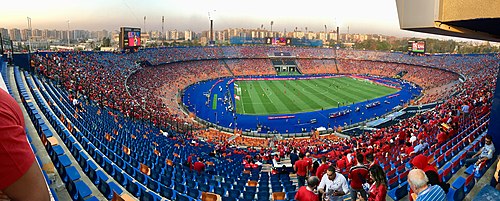
Cairo International Stadium is located in Cairo, Egypt. It has a seating capacity of 75,000 and is the fourth-largest stadium in Africa. The stadium was opened in 1960 and underwent significant renovations in 2005. It is the home stadium of the Egyptian national football team and several local clubs.
READ ALSO » Top Largest Insurance Company In The World
The stadium has a traditional oval-shaped design and is surrounded by lush greenery. It is equipped with modern facilities, including VIP boxes, a press center, and several food and beverage outlets.
4. Stade 5 Juillet 1962, Algeria
Stade 5 Juillet 1962 is located in Algiers, Algeria. It has a seating capacity of 75,000 and is the fifth-largest stadium in Africa. The stadium was opened in 1972 and underwent renovations in 2003. It is the home stadium of the Algerian national football team and several local clubs.
The stadium is the home of the Algerian national football team and several local clubs. The stadium has a unique design, with a circular seating bowl and a distinctive roof that resembles a flying saucer. It is equipped with modern facilities, including VIP boxes, a press center, and several food and beverage outlets.
5. Stade Mohamed V, Morocco
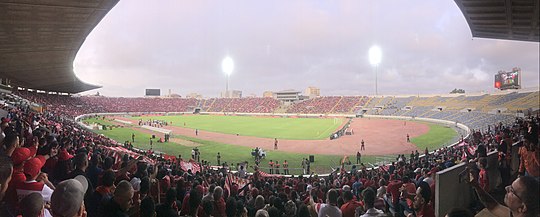
Stade Mohamed V is located in Casablanca, Morocco. It has a seating capacity of 67,000 and is the sixth-largest stadium in Africa. The stadium was opened in 1955 and underwent significant renovations in 2021. It is the home stadium of the Moroccan national football team and several local clubs.
6. Stade 26 Mars, Mali
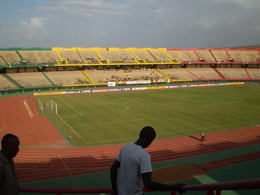
Stade 26 Mars is located in Bamako, Mali. It has a seating capacity of 60,000 and is the seventh-largest stadium in Africa. The stadium was opened in 2001 and is the home stadium of the Malian national football team and several local clubs.
7. Ellis Park Stadium, South Africa
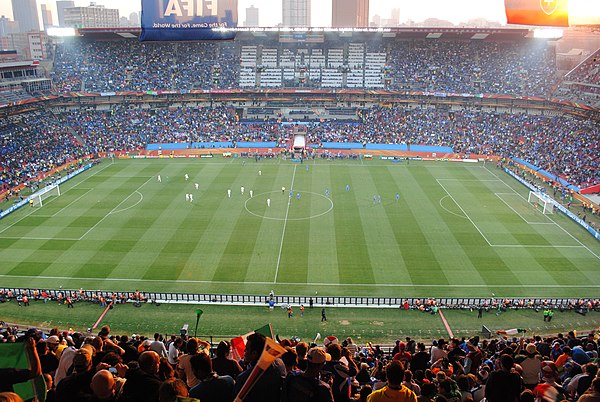
Ellis Park Stadium is located in Johannesburg, South Africa. It has a seating capacity of 60,000 and is the eighth-largest stadium in Africa. The stadium was opened in 1928 and underwent significant renovations in 1982 and 2009. It is the home stadium of the Golden Lions rugby team and the Lions football team.
8. Estádio 11 de Novembro, Angola
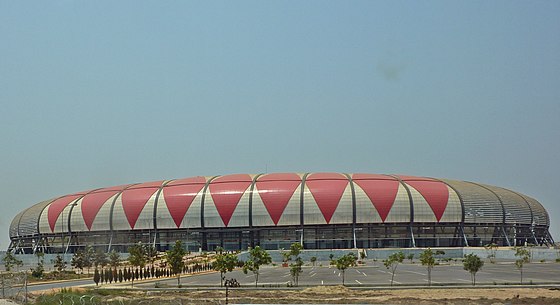
Estádio 11 de Novembro is located in Luanda, Angola. It has a seating capacity of 50,000 and is the ninth-largest stadium in Africa. The stadium was opened in 2010 and is the home stadium of the Angolan national football team and several local clubs.
9. National Stadium, Nigeria
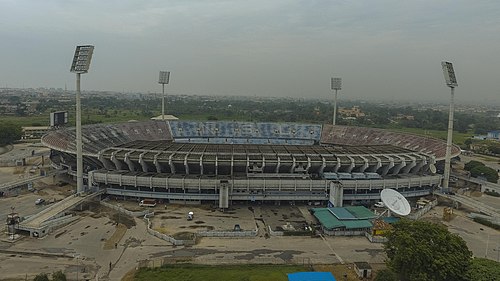
National Stadium is located in Lagos, Nigeria.
READ ALSO » Top 10 Biggest/Largest Stadiums In The World
It has a seating capacity of 45,000 and is the tenth-largest stadium in Africa. The stadium was opened in 1972 and underwent renovations in 1999. It is the home stadium of the Nigerian national football team and several local clubs.
It hosted several international competitions including the 1980 African Cup of Nations final, the 2000 African Cup of Nations final, and FIFA World Cup qualifying matches. It also served as the main stadium for the 1973 All-Africa Games.
10. Lucas Moripe Stadium, South Africa
Lucas Moripe Stadium, located in Pretoria, South Africa, has a seating capacity of 28,900. The stadium was built in 2009 and is primarily used for football matches. It is the home stadium of the local club SuperSport United and has also hosted several international football competitions, including the COSAFA Cup and the African Nations Championship. The stadium has a modern design, with a rectangular seating bowl and a distinctive curved roof. It is equipped with modern facilities, including VIP boxes, a press center, and several food and beverage outlets.
Honorable mentions
- Stade Olympique de Radès, Tunisia (45,000)
- Stade Mustapha Tchaker, Algeria (40,000)
- Moses Mabhida Stadium, South Africa (40,000)
- Leopold Sedar Senghor Stadium, Senegal (60,000, currently under renovation)
In conclusion, these stadiums are not only architectural masterpieces, but they also serve as gathering places for people to come together and celebrate their favorite sports teams, musicians, and cultural events. As Africa continues to grow and develop, we can expect more impressive stadiums to be built in the coming years, further showcasing the continent's passion for sports and entertainment.
